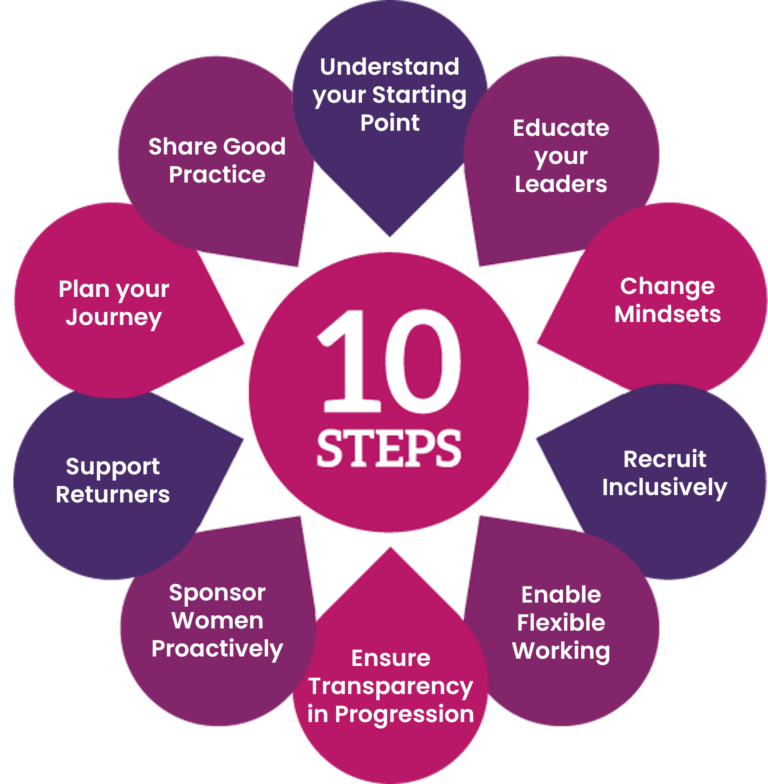

Our proven Ten Steps Framework is an industry-led campaign that aims to ensure women in science, technology, engineering and maths (STEM) careers have the same opportunities to thrive as men.
Meaningful change can only be accomplished by working together to remove gender bias, to increase the number of female role models in the industry, and to level the playing field for women wanting to progress in STEM. The programme is supported by numerous high-profile businesses across the UK who have pledged to recruit, retain and develop female talent.
A key benefit of becoming a Ten Steps signatory is access to our Ten Steps diagnostic tool which will identify ten key areas where your business can improve gender balance to help you foster a truly inclusive culture. The tool is complemented by many practical resources including inspiring case studies and best practice from industry changemakers. You’ll also be invited to take part in our annual Measuring Progress Event, which allows you to track your progress and share learnings with others.
Companies that have submitted results for our annual benchmarking event since 2016 have seen cultural change and increased their Ten Steps scores by an average of 30% over that time.
What are the WISE Ten Steps?
1. Understand Your Starting Point
Organisations need data to solve problems. Data is also essential for tracking progress – if you don’t know where you were, you won’t know how far you’ve come. Companies must identify specific hurdles before they can create solutions and measure the progress they are making.
2. Educate Your Leaders
Senior managers must understand how improved gender balance can benefit the business as a whole and how the culture needs to change to achieve this. They should visibly support and communicate the need for a diverse and inclusive workforce and be held accountable for delivering this.
3. Change Mindsets
Changing the way people think and behave is a long-term challenge. Creating a culture that genuinely values and promotes diversity and inclusion requires not only a thorough review of company policies but zero-tolerance of bias and sexism at all levels of the company.
4. Recruit Inclusively
Recruiting in the same way you always have won’t bring in fresh talent. You will need a more creative and open-minded approach. Thinking differently about the way STEM jobs are designed and advertised will attract a wider talent pool and help you find the best person for the job.
5. Enable Flexible Working
Flexible working choices can increase the pool of potential recruits and stem the loss of skilled employees mid-career. If you are serious about equality, diversity and inclusion, you must go beyond the statutory requirements and treat flexible working as a natural and positive option – and one that is no barrier to progression.
6. Ensure Transparency in Progression
Your organisation must be open and inclusive. If women are to get the same career chances as men, they must know be shown what’s on offer and feel confident about putting themselves forward. That may not happen if opportunities are promoted solely through traditional networks. It is important that all employees know what is available and have the support necessary to plan and advance their careers.
7. Sponsor Women Proactively
In industries where men so often have the advantage in terms of visibility and traditional expectations, women may need specific encouragement to progress to leadership roles. Talented women and men need to have genuinely equal opportunities to realise their potential.
8. Support Returners
It is not enough to have equality, diversity and inclusion policies in place. You must send out the clear message that your business wants and needs talented women and people from other under-represented groups, and that you want to help them realise their potential as STEM professionals.
9. Plan Your Journey
Success in improving diversity is not a side issue: it is critical to the business. It needs to be understood and championed at the most senior level, as well as adequately resourced and promoted throughout the organisation.
10. Share Good Practice
Improving gender balance is a challenge and a business imperative, across the entire STEM industry. It is not a problem just for individual companies. Sharing successes both within and outside organisations through interactive sessions such as the WISE Measuring Progress and other Knowledge Sharing Events, will deliver many cross-industry business benefits.
What is the origin of the Ten Steps?
In February 2014, WISE met industry partners at Number 10 Policy Unit in a bid to understand how what a holistic initiative to improve gender balance in STEM might look like.
The Ten Steps framework emerged from that meeting and subsequent conversations. This is a framework or programme that provides a co-ordinated set of actions that STEM employers can use to improve diversity in their workforce based on lessons learnt by other organisations.
The Ten Steps comprises ten distinct challenges or pain points for companies looking to create cultural change, it has also been designed with company performance and the business case for diversity in mind. A commitment to all ten steps will make a positive difference to diversity within your organisation, as well as its overall competitive standing.
